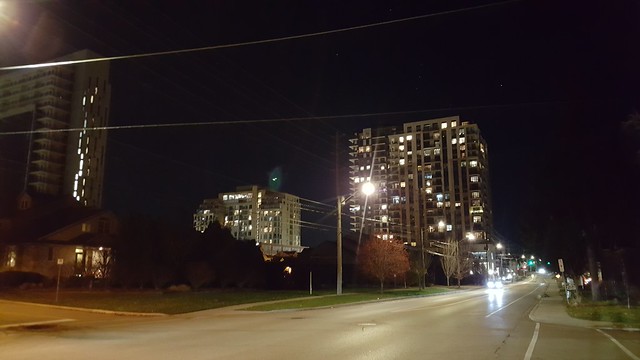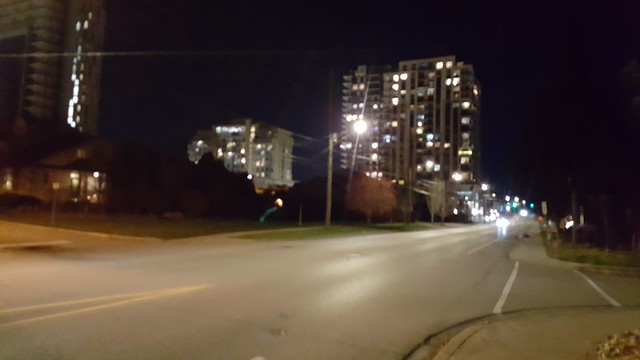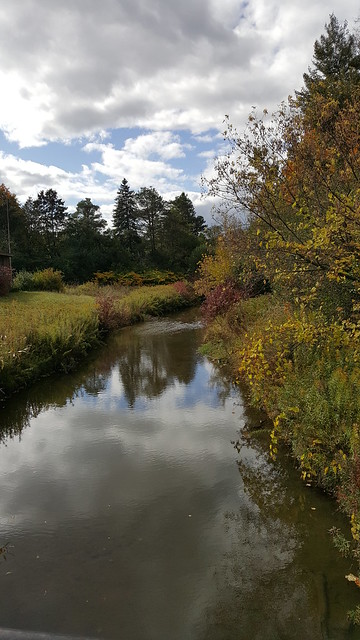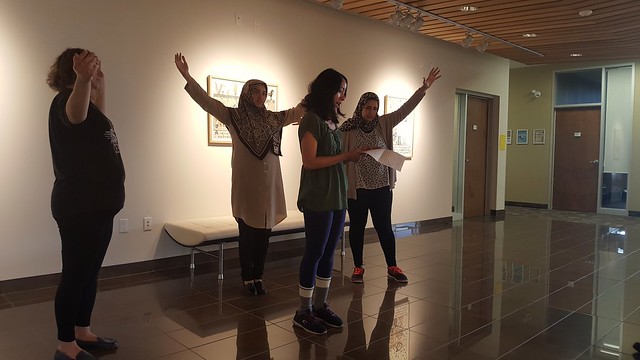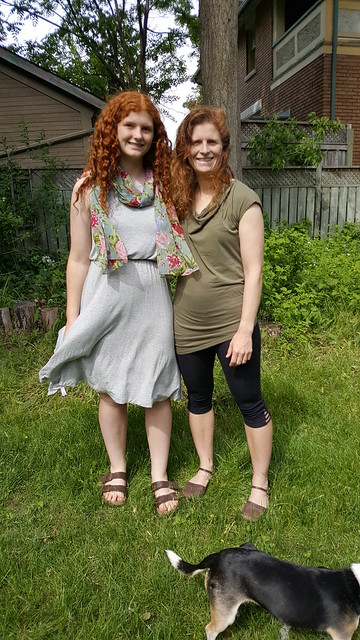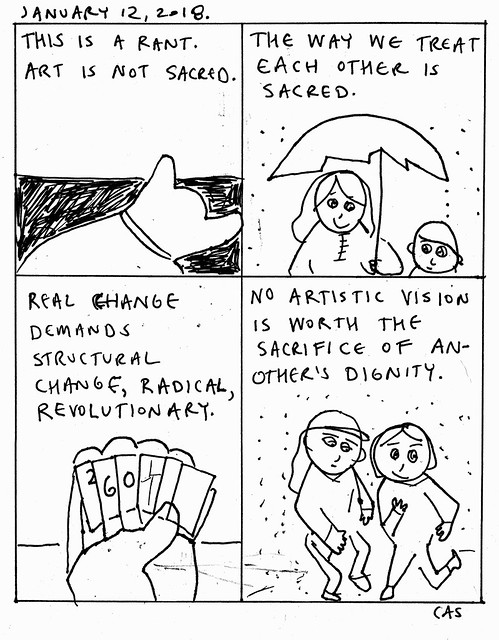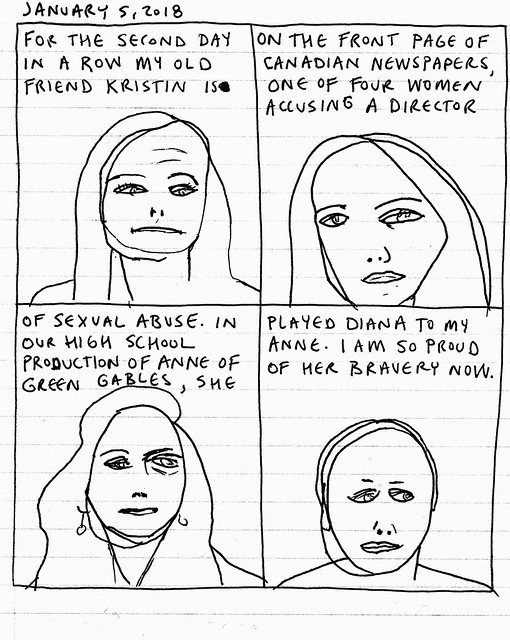Category: Feminism
Monday, Dec 16, 2019 | Big Thoughts, Confessions, Feminism, Friends, Space, Word of the Year, Writing |

My word-of-the-year group met last week for the last time in 2019. My word this year, SPACE, was resonant and practical, and has met me where I’m at in terms of my goals and aspirations. Essentially, a year ago, I determined that I wanted / needed / craved more space, specifically more space to write. Space and time are inextricably linked. They can’t be separated.
But so are space and discomfort. (As far as I know, Einstein didn’t weigh in on this theory.) Let me explain.
What I’ve come to believe is that I am the source of my own space. If I feel crowded out of my life, it is because I have chosen to be a person crowded out of her own life. I am the biggest obstacle in the path to my own contentment, and enlightenment; conversely, I am also the person capable of removing said obstacle. The expectations of others are not holding me back — my own expectations are the source of my unhappiness. What I’m sparing myself, by building a life that is crowded and that crowds me out, is discomfort.
Anything I give space to will cause me some discomfort, and the opposite of feeling discomfort is so often, instead, feeling resentment. It’s something we don’t think about much. But the fact is, we are much more comfortable feeling resentment (and anger, annoyance, irritation) because it is an outward emotion — we can send it toward the object of our resentment. Discomfort is an interior emotion that asks us to be responsible, to accept the cause of our discomfort as our own choosing.
Any choices I’ve made that I value have caused me to feel discomfort. Giving space to listen to opposing positions — discomfort. Saying no to people and opportunities — discomfort. Waiting with a writing project as it forms and develops — discomfort. Allowing a child to wrestle with their own problems — discomfort. Taking a leadership role and being responsible for decisions that affect others — discomfort.

What I’ve learned this year is that when I allow myself to focus more fully on what I’ve named as my desire — time and space to devote to my writing — I also have to confront my insecurities, which come crowding into all this open space. It’s uncomfortable. I feel vulnerable. Exposed. Teaching was easy to talk about, pretty much universally understood and accepted as a positive and recognizable undertaking. The ambition of developing an ongoing career as a literary fiction writer in a market that is facing serious existential challenges: not so easy to talk about. Even that sounds like an excuse, as I read it over. And so I’ll revise: It’s not so easy to talk about my ambition to continue developing my craft as a literary fiction writer in the absence of new publications. But it’s true to what I’m doing.
And I’m incredibly fortunate to be able to name that desire, and pursue it, at least for the time being. I do feel discomfort being here. But I know discomfort is here because I’ve given it space to be here. In a sense, I’ve actively invited discomfort to be my companion. I also know that I wouldn’t feel better in the throes of resentment, overwhelmed by commitments, wishing and longing to pursue my deeper ambition; I would feel different, yes, running on fumes, exhausted, stretched thin, maybe full of certainty and outward purpose, maybe not; but definitely not better.
In conclusion, my year of making space has somehow turned into an examination of discomfort. And I’ve realized that I’m unexpectedly comfortable with discomfort. I have a pretty high tolerance for feeling it. I think, if deployed under the right set of circumstances, this might even be a super-power.
xo, Carrie
Thursday, Nov 28, 2019 | Big Thoughts, Book Review, Books, Confessions, Exercise, Feminism, Mothering, Politics, Space, Success, Word of the Year |

I’ve read some excellent books these past few months, all by women, mainly fiction. Most recently, I finished THREE WOMEN, by Lisa Taddeo, creative-non-fiction, and the kind of book a person wants to discuss afterward with someone else. In the absence of a book club, I bring my thoughts to you. (This is how compelling the book is: I was reading on the couch last weekend, sharing a blanket with my eldest daughter, when she suddenly said, “Wow that book must be good, Mom. You haven’t fallen asleep!”)
(Possibly related note: the book has a lot of graphic descriptions of sex. But in my interpretation, as you’ll see below, the sex stands in for desire more generally.)
 THREE WOMEN is a book about women’s desire as examined through the lens of sexual desire(s) that our culture would call taboo. One woman defines herself as a submissive and has sex with other men and women while her husband watches or participates. One woman, in an almost-sexless marriage, has an affair with a former boyfriend after connecting on FB. One woman, as a high school student, was pursued by and sexually involved with a teacher, and when charges are pressed years later, the teacher is absolved and she is destroyed.
THREE WOMEN is a book about women’s desire as examined through the lens of sexual desire(s) that our culture would call taboo. One woman defines herself as a submissive and has sex with other men and women while her husband watches or participates. One woman, in an almost-sexless marriage, has an affair with a former boyfriend after connecting on FB. One woman, as a high school student, was pursued by and sexually involved with a teacher, and when charges are pressed years later, the teacher is absolved and she is destroyed.
But she had already been destroyed. (This is not a spoiler; the book’s propulsive nature relies on exploration of character rather than plot.)
The most interesting section, for me, comes in the epilogue, when the author unpacks, most explicitly, the subject she’s been examining, and reveals that this particular desire she’s been exploring throughout is an exemplar for anything a woman wants—desire, generally.
Her mother, dying, has something she agrees to reveal to her daughter. Something she wants to tell her.
Are you ready? She asked me.
Yes, I said. I got close to her face. I touched her cheek. It was still warm and I knew it wouldn’t be for long.
Don’t let them see you happy, she whispered.
Who?
Everyone, she said wearily, as though I had already missed the point. She added, Other women, mostly.
I thought it was the other way around, I said. Don’t let the bastards get you down.
That’s wrong. They can see you down. They should see you down. If they see you are happy, they will try to destroy you.
But who? I asked again. And what do you mean? You sound crazy.
Later, the author writes: “… we cannot exactly say that we expect to be happy.”
Finally: “There was a beauty in how little my mother wanted. There’s nothing safer than wanting nothing. But being safe in that way, I’ve come to know, does not inure you to illness, pain, and death. Sometimes the only thing it saves is face.”

So let’s talk about desire. Not sexual desire. Desire. Naming our hopes, our aspirations out loud.
Personally, I have trained myself to expect less, and perhaps also to want less, to make do with less, to make less a wonderful shelter, in a way, a goodness and righteousness, a way of life. I do believe, morally, in the ethic of more with less. But I also can see how lowering my expectations, and being afraid to name what I want (out loud or even quietly to myself) could make my whole life so much smaller. But if I name what I want, am I not guaranteeing I’ll never receive it? Jinx! Touch wood. I do this, when I accidentally state out loud something hoped-for.
In truth, I’m morally opposed to the idea of bottomless aspirational desire, of eternally needing and wanting more, which always seems to come at the expense of others. I disagree with inflicting harm on other people to favour one’s own pleasure. That is why the stories of two of the women in this book were more difficult for me to understand—acts of self-pleasure are rarely victimless. Can desire be healthy if acting upon it will damage those to whom we owe our loyalties and responsibilities?

I’ve been thinking about how comparing ourselves to others is a fast-track to misery. It’s a fast-track to bitterness, envy, and a form of self-loathing that we often turn outward on the object of our comparison. I fought these very feelings yesterday morning in a weight class at the gym, working out next to a woman who seemed effortlessly to wield weights heavier than mine, whose endurance was always greater than mine. My attention was divided, and I kept diminishing my own efforts, even while thinking things like: She must have more time to work out than I do, or even, It can’t be healthy to work out as much as she must, to be in such good shape. I also recognized, even as my thoughts ran in this direction, that any discontent I was feeling was so wholly not this stranger’s responsibility, but my own.
I wonder whether comparison whispers to us that we should have been wanting more all along, that our suppression of desire has cheated us somehow? Does it make us question our life choices? Recognize invisible alternate realities all around us that may already be closed to us?
Is our comparative envy perhaps also related to a scarcity of resources? For women, there is an extreme scarcity of resources around desire, success, and achievement. We have a very narrow window of acceptable achievement, and of the way to acceptably achieve. Naming our desires is not so straightforward. We have to be so careful not to name desires that would hurt others (as I said above), especially our children. We struggle, too, to claim our own successes. We work so hard to keep in balance all these pieces of ourselves — and our expectations for ourselves — that we inevitably fail on one important front or another.
We cannot exactly say that we expect to be happy. Is this a gift we could give to each other, especially as women? — admiration for each other’s strengths, in tandem with appreciation for our own.
xo, Carrie
Wednesday, Oct 23, 2019 | Art, Big Thoughts, Dream, Feminism, Fire, Friends, Good News, Lynda Barry, Organizing, Space, Spirit, Stand, The X Page, Work |

After a summer to reflect on The X Page workshop and its reverberations, our ad hoc collective is preparing for a second season, with new workshop sessions starting in January, 2020.
In connected news, I’ve been freshening up my website, and have built a new page devoted to The X Page — please visit, look around, share. We are currently in the process of seeking candidates for the next season, so if you’re in the Waterloo Region, and you’re interested or know someone who might be, send them here.

The original project was a lot of work, there was no way around that conclusion, and many of us felt burnt-out following the final performance. Our discussions this summer circled around how to make the project sustainable for all involved, and we began to define the different leadership roles with more specificity, create a long-term plan for funding, and identify elements from the original production that could be revised or reframed. We also wanted to make space within the workshop for former participants to return in leadership roles.
For the 2020 season, The New Quarterly literary magazine has taken over a number of administrative tasks and responsibilities, which frees me and Lamees (who co-coordinated the first workshop with me) from much of the grinding effort necessary to get the project off the ground. I’m excited to be the production’s “stage manager,” a role which I rather accidentally filled last time around (and loved!), while Lamees will be working more directly with candidates during the recruitment process. I’m thankful for our ongoing conversations with Pamela Mulloy, the editor of The New Quarterly — and with others — as we continue to learn from and develop this project. This is not a static process.

Personally, it’s been a gift from the universe to be able to work on a project that combines so many of my interests, including Lynda Barry’s life-changing exercises (the “X page” of the workshop’s title), multi-disciplinary creative team-work, and the power of personal storytelling. I’ve got a running theory that the antidote to (and inoculation from) xenophobia, misogyny, and fear of others’ cultures, religions, and beliefs, is immersion in stories. You can’t sit with someone and listen to their stories without being changed in some way. Especially the particular stories that emerge from Lynda Barry’s X Page — stories that may on their surface appear ordinary, every day, but therein lies their power: X Page stories are rich with sensory detail, evoking images that transfer from speaker to listener, images that pull us directly into another human being’s experience. Being part of this process, through the workshop, is powerful.
Please spread the word.
xo, Carrie
Friday, May 17, 2019 | Art, Big Thoughts, Coaching, Confessions, Feminism, Organizing, Peace, Space, Spirit, Word of the Year, Writing |

Sometimes my skin feels too porous, and emotions pour in almost painfully. Yesterday, I started reading a personal essay in the newspaper written by the mother of a child on the autistic spectrum who was being bullied by classmates, people he thought were his friends. I had to stand up and walk away, so strong were my feelings of sickness and pain, gut-deep, a grief and horror that seemed to wash through my bloodstream.
I stood by the sink and wept.

Stories of exclusion, cruelty, judgement of others trouble me so deeply I can hardly tolerate the pain. I guess here in my mind, I live in a world in which people see each other, are kind to each other, have compassion for each other; but in the real world, there is a lot of pain inflicted even by people who are trying to be kind; pain is also inflicted by people who only want to be left alone, people who don’t want to engage, people who don’t care, who are struggling with their own troubles; and there is pain actively inflicted by people who fear and hate others for their differences, people who don’t want to understand or learn or listen, people who actively target others, weaker and more marginalized than themselves.
I can’t make sense of it.
It just doesn’t make sense in my brain.
I don’t have solutions. I can only to attempt to make spaces for that version of the world that exists in my mind to exist in real life. I’ve tried in the classroom, on the soccer field, inside my own family, and in this storytelling workshop. I know I’ve gotten things wrong. I suspect I’m sometimes the person who’s inflicted pain when trying to be kind, and acting in ignorance. But I’d rather try than hide. There is no alternative that makes sense to me.

XPagePerformance2019WEBAD
For the past 11 weeks, I’ve been privileged to be part of The X Page Workshop. It was envisioned as a creative and collaborative undertaking that would bring together women from different cultural backgrounds, all of whom are making lives for themselves and their families in Canada. Each week, a group of almost 30 of us have met to work on writing and staging stories. Together, we’ve made something that’s rich and enriching. Just with stories! Just with stories and goodwill, trust, kindness, and effort. When we’re together in the beautiful space at the Centre for Peace Advancement, as we have been every Tuesday evening since March, I feel immersed in the possibility of the world inside my mind becoming a real place. It feels like a real place, then and there.
Just thinking about being there brings me a sense of peace and ease.

It isn’t perfect. Why should it be? This world in my mind has conflict, but it also has ways of talking about conflict, because there is trust, and the trust is constantly being earned. Each small thing offered, in this world in my mind, is actually a really big thing. Our gifts to each other don’t have to be grand gestures, large acts, or come from a place of material wealth.
I think the best gift we can give to someone else is to see and acknowledge them without wanting or trying to change them in any way.
Unconditional love.
To live in this world in my mind, I have to try to live with unconditional love. And that means feeling too porous sometimes to the brokenness in the real world. That means loving what’s broken, too, unconditionally. And that hurts. But it’s the only thing that makes any sense to me at all.
xo, Carrie
Friday, Sep 28, 2018 | Big Thoughts, Confessions, Feminism, Fire |

I rode my bike to campus this morning with tears streaming down my cheeks. Tears of pain and rage. How can I explain? I was heading to a meeting with a colleague. We are working together on a project that will bring women whose identities have been fragmented by disruption, war, movement across borders, together in the same room to tell their stories. I see I’ve used the word together twice in that last sentence. I know it’s poor construction, but my subconscious knows what it’s talking about. As I biked in this state of flaming fury across the park, uncontrollable tears streaming down my face, what I wanted, what I felt would heal me or give me hope, would be to come together with other women and do something meaningful. When I arrived on campus and confessed my state of emotional disarray, my colleague told me that she believes what was staged in US Congress yesterday was deliberate and calculated — to cause pain. They put a woman’s history of pain on display so they could show us — this doesn’t matter, we have the power. We’re going to install this angry, self-pitying, credibly accused sexual assaulter to a position of almost unimaginable power over you and your bodies, and your stories do not matter.
I almost can’t type these words for the rage that is coursing through my body, causing my hands to shake.
Has any woman come to adulthood without having been, at some point (or many points!) in her life, treated as an object, a body, to be mocked or admired or possessed or controlled? Has any woman come to adulthood without having been patronized, sexualized, diminished, or ignored? Has any woman not struggled to find the perfect script, the words she must speak and the role she must inhabit if she is to be taken seriously, if her story is to be believed—only to realize that in fact, for her, there is no perfect script. No perfect script exists, just a series of scripts and roles designed to be turned against her.
What does this do to us, collectively?
It’s gaslighting at every turn. We want to say, but it’s better now—it’s better now! And isn’t it? Girls can be anything they want to be! Dads can look after their kids without receiving medals of honour for their efforts! Canada’s foreign minister is a formidable woman!
And yet. And yet. Is it better now? If a man credibly accused of multiple sexual assaults can be president? If all you need to get onto the Supreme Court is an in with the old-boys in Congress?
Who are we kidding?
I heard about a group of women who decided to go out into the streets of Washington DC yesterday and SCREAM. That’s about right, I thought.
I want to scream. I might even do it. But after that, it’s fuel. Fury as fuel. Whether it’s in small acts or large, I’m going to keep burning down the patriarchy, this rotten system that’s so insidious it makes us think that a man’s rage is “passionate” while a woman’s is “hysterical.” Let’s burn down colonialism while we’re at it, and white supremacy. And if these systems prove temporarily fire-proof, I’m not giving up. I’m going to take my tiny flame and light a bunch of candles and put them in all the windows of my house. I’m going to burn my energy to make space for all the stories that need to be told, that aren’t being told. I’m going to make space for creativity, because it will heal us like nothing else. To know that we are creative beings is healing in and of itself. To experience our generative selves is healing.
I’m going to model the shit out of what I want to see in the world. Can’t we be the change, be the change, be the change? Let’s do this! Let’s pour our energy and time into bringing people together to make something together. Together. Together. Doesn’t matter how small. The whole family sitting around the table for a meal counts. A soccer team of girls huddling to cheer each other on counts. Two colleagues meeting in an office to dream of using our talents to make something happen counts. It all counts. I know you know this too. Imagine what we are going to do; recognize what we’re already doing; remember what we’ve already done.
xo, Carrie
Friday, Jan 12, 2018 | Art, Feminism, Fire, Politics, Spirit, Stand |

This is a rant. Art is not sacred. The way we treat each other is sacred. Real change demands structural change, radical, revolutionary. No artistic vision is worth the sacrifice of another’s dignity.
Today on our early morning run, Heather and I talked about structure. How humans hew to structure, even if it’s not serving us well, because that is our nature. Real change demands structural change; true on scales both macro and micro, societal and individual. I wish I had the tools and knowledge and education to do something that would support wide and deep systemic change. Or maybe that’s not how systemic change occurs. Maybe it’s more radical and revolutionary. I believe in policy, and the power of policy to affect change, but unless it’s applied, policy is worthless and sometimes worse than worthless — because it provides a mask to corruption while pretending to hold the system to account. Why didn’t they report earlier? Why are they coming out now? They should have gone to police. This is a case for the courts, not the court of public opinion. It’s nothing but unsubstantiated gossip. Fill out the paperwork, go through the proper channels, and we’ll get back to you.
Yeah, this is a rant.
This morning, I heard a snippet from a radio interview: a woman arguing that the penalties against the former director of Soulpepper theatre in Toronto were too harsh — He built the company! His artistic genius! (Full disclosure, one of the complainants in the civil case against him was a high school friend, though we haven’t been in touch for many years.) To the woman on the radio, I raged: You’re arguing that artistic vision is worth the sacrifice of people’s safety. You would protect a man whose behaviour at work harmed people — because he was a good fundraiser??? Because the art was good??? This is skewed morality.
Art is not sacred. The arts are not sacred.
The way that we treat each other as human beings is sacred, or should be.

For the second day in a row my old friend Kristin is on the front page of Canadian newspapers, one of four women accusing a director of sexual abuse. In our high school production of Anne of Green Gables, she played Diana to my Anne. We had so much fun. Kristin absolutely sparkled with wit and comedic talent. I am so proud of her bravery now.
I have a theory. Power may indeed corrupt and absolute power may indeed corrupt absolutely, but many who seek power are already corrupt, particularly in systems in which corruption, in its many forms, is rewarded: think manipulation, harassment, bullying, and other norm-flaunting, disrespectful, selfish and narcissistic behaviour. Those more inclined toward self-reflection, those who don’t want to harm others for their own profit (or be harmed), who don’t want to lie and self-inflate and backstab and cheat to “play the game” are weeded out of the system, deemed weak, losers, failures. The powerful believe their behaviour is normal.
Maybe we all do — until we don’t.
Let’s say that time is now. Let’s find ways to circumvent the system until the system changes.
I repeat: Art is not sacred. Neither are artists. The artistic process has never needed to be destructive, harmful, cruel, violent, vindictive, ugly, competitive, or vicious in order for good art to exist. Don’t be fooled by the propaganda.
Bottom line: If you’re hurting people in the process of making your art, you’re doing it wrong. You never earn the right to be an asshole. (Also, side note: nobody needs to see your penis.)
xo, Carrie




 THREE WOMEN is a book about women’s desire as examined through the lens of sexual desire(s) that our culture would call taboo. One woman defines herself as a submissive and has sex with other men and women while her husband watches or participates. One woman, in an almost-sexless marriage, has an affair with a former boyfriend after connecting on FB. One woman, as a high school student, was pursued by
THREE WOMEN is a book about women’s desire as examined through the lens of sexual desire(s) that our culture would call taboo. One woman defines herself as a submissive and has sex with other men and women while her husband watches or participates. One woman, in an almost-sexless marriage, has an affair with a former boyfriend after connecting on FB. One woman, as a high school student, was pursued by